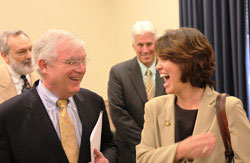What is the Consortium of Universities for Global Health (CUGH)?
September - October, 2009 | Volume 8, Issue 5

Rep. Betty McCollum, D-Minn., greets Duke
University’s Dr. Michael Merson at a Capitol
Hill briefing she hosted as co-chair of the
Congressional Global Health Caucus. Also
pictured are Boston University’s Dr. Gerald
Keusch and Dr. Donald Thea.
The Consortium of Universities for Global Health (CUGH) sprang from an idea conceived by former Fogarty Director Dr. Gerald Keusch. Last year, it held its first organizing meeting among 20 members at the University of California, San Francisco.
There are 58 members now, and the four criteria for membership are:
- A well-established global health program
- An interdisciplinary program nearly always involving more than one school
- Activities encompassing education and training, research and service
- A well-established and functioning international partnership
Dr. Haile T. Debas of the University of California, San Francisco, chairman of the founding board of directors, outlines some of the Consortium's first priorities:
- Defining what is meant by global health education in terms of curricula and competencies
- Collaborating among members in research, training and service
- Developing a common "platform" for members to facilitate their work overseas
- Developing policy and advocacy in support of global health
- Creating international partnerships for human and institutional capacity building
"I am hopeful that the Consortium will ensure that we catch the crest of the wave of excitement and idealism in our students and faculty to make universities a transforming force in global health," Debas says.
To view Adobe PDF files,
download current, free accessible plug-ins from Adobe's website.